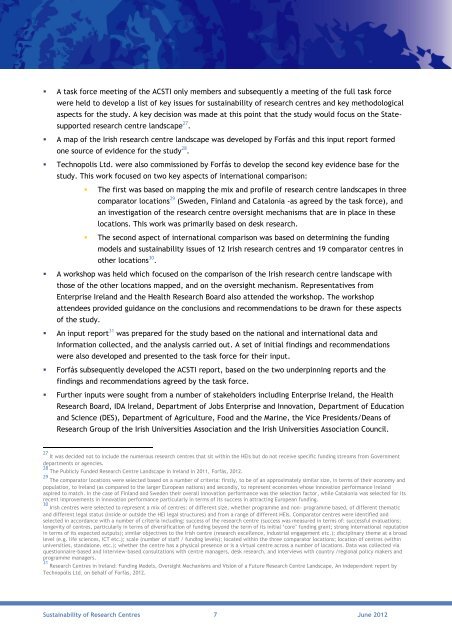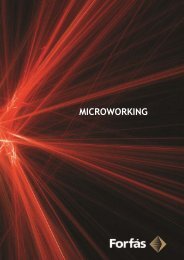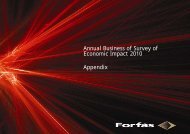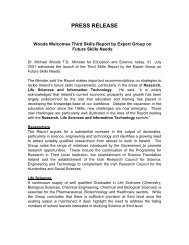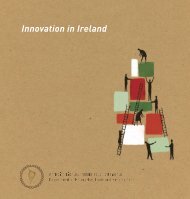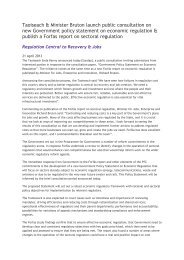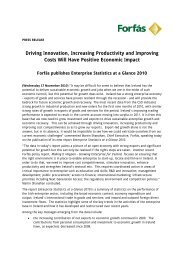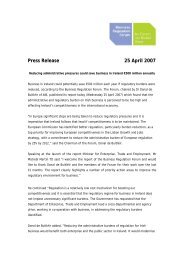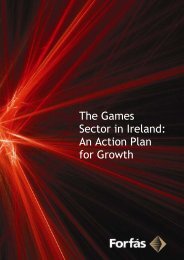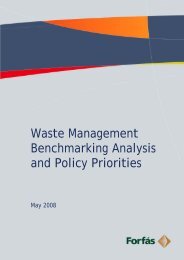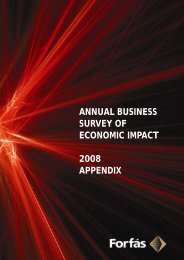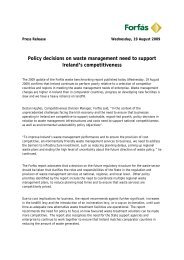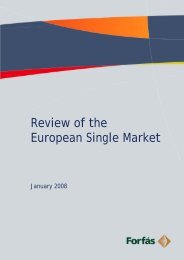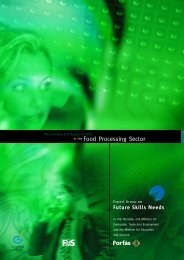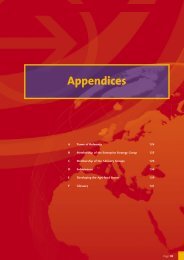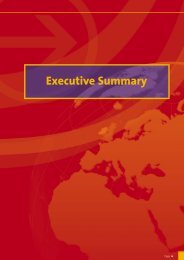Sustainability of Research Centres - Advisory Science Council
Sustainability of Research Centres - Advisory Science Council
Sustainability of Research Centres - Advisory Science Council
You also want an ePaper? Increase the reach of your titles
YUMPU automatically turns print PDFs into web optimized ePapers that Google loves.
A task force meeting <strong>of</strong> the ACSTI only members and subsequently a meeting <strong>of</strong> the full task force<br />
were held to develop a list <strong>of</strong> key issues for sustainability <strong>of</strong> research centres and key methodological<br />
aspects for the study. A key decision was made at this point that the study would focus on the State-<br />
supported research centre landscape 27 .<br />
A map <strong>of</strong> the Irish research centre landscape was developed by Forfás and this input report formed<br />
one source <strong>of</strong> evidence for the study 28 .<br />
Technopolis Ltd. were also commissioned by Forfás to develop the second key evidence base for the<br />
study. This work focused on two key aspects <strong>of</strong> international comparison:<br />
The first was based on mapping the mix and pr<strong>of</strong>ile <strong>of</strong> research centre landscapes in three<br />
comparator locations 29 (Sweden, Finland and Catalonia -as agreed by the task force), and<br />
an investigation <strong>of</strong> the research centre oversight mechanisms that are in place in these<br />
locations. This work was primarily based on desk research.<br />
The second aspect <strong>of</strong> international comparison was based on determining the funding<br />
models and sustainability issues <strong>of</strong> 12 Irish research centres and 19 comparator centres in<br />
other locations 30 .<br />
A workshop was held which focused on the comparison <strong>of</strong> the Irish research centre landscape with<br />
those <strong>of</strong> the other locations mapped, and on the oversight mechanism. Representatives from<br />
Enterprise Ireland and the Health <strong>Research</strong> Board also attended the workshop. The workshop<br />
attendees provided guidance on the conclusions and recommendations to be drawn for these aspects<br />
<strong>of</strong> the study.<br />
An input report 31 was prepared for the study based on the national and international data and<br />
information collected, and the analysis carried out. A set <strong>of</strong> initial findings and recommendations<br />
were also developed and presented to the task force for their input.<br />
Forfás subsequently developed the ACSTI report, based on the two underpinning reports and the<br />
findings and recommendations agreed by the task force.<br />
Further inputs were sought from a number <strong>of</strong> stakeholders including Enterprise Ireland, the Health<br />
<strong>Research</strong> Board, IDA Ireland, Department <strong>of</strong> Jobs Enterprise and Innovation, Department <strong>of</strong> Education<br />
and <strong>Science</strong> (DES), Department <strong>of</strong> Agriculture, Food and the Marine, the Vice Presidents/Deans <strong>of</strong><br />
<strong>Research</strong> Group <strong>of</strong> the Irish Universities Association and the Irish Universities Association <strong>Council</strong>.<br />
27<br />
It was decided not to include the numerous research centres that sit within the HEIs but do not receive specific funding streams from Government<br />
departments or agencies.<br />
28<br />
The Publicly Funded <strong>Research</strong> Centre Landscape in Ireland in 2011, Forfás, 2012.<br />
29<br />
The comparator locations were selected based on a number <strong>of</strong> criteria: firstly, to be <strong>of</strong> an approximately similar size, in terms <strong>of</strong> their economy and<br />
population, to Ireland (as compared to the larger European nations) and secondly, to represent economies whose innovation performance Ireland<br />
aspired to match. In the case <strong>of</strong> Finland and Sweden their overall innovation performance was the selection factor, while Catalonia was selected for its<br />
recent improvements in innovation performance particularly in terms <strong>of</strong> its success in attracting European funding.<br />
30<br />
Irish centres were selected to represent a mix <strong>of</strong> centres: <strong>of</strong> different size, whether programme and non- programme based, <strong>of</strong> different thematic<br />
and different legal status (inside or outside the HEI legal structures) and from a range <strong>of</strong> different HEIs. Comparator centres were identified and<br />
selected in accordance with a number <strong>of</strong> criteria including: success <strong>of</strong> the research centre (success was measured in terms <strong>of</strong>: successful evaluations;<br />
longevity <strong>of</strong> centres, particularly in terms <strong>of</strong> diversification <strong>of</strong> funding beyond the term <strong>of</strong> its initial ‘core’ funding grant; strong international reputation<br />
in terms <strong>of</strong> its expected outputs); similar objectives to the Irish centre (research excellence, industrial engagement etc.); disciplinary theme at a broad<br />
level (e.g. life sciences, ICT etc.); scale (number <strong>of</strong> staff / funding levels); located within the three comparator locations; location <strong>of</strong> centres (within<br />
universities, standalone, etc.); whether the centre has a physical presence or is a virtual centre across a number <strong>of</strong> locations. Data was collected via<br />
questionnaire-based and interview-based consultations with centre managers, desk research, and interviews with country /regional policy makers and<br />
programme managers.<br />
31<br />
<strong>Research</strong> <strong>Centres</strong> in Ireland: Funding Models, Oversight Mechanisms and Vision <strong>of</strong> a Future <strong>Research</strong> Centre Landscape, An independent report by<br />
Technopolis Ltd. on behalf <strong>of</strong> Forfás, 2012.<br />
<strong>Sustainability</strong> <strong>of</strong> <strong>Research</strong> <strong>Centres</strong> 7 June 2012


